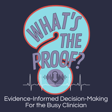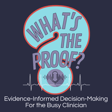
#6 SGLT-2 Inhibitors: One Med to Rule Them All? - Austin Bush, MD
How can one class of medication be beneficial in treating type 2 diabetes, heart failure, and chronic kidney disease? It may seem too good to be true, but your hosts welcome guest Austin Bush, MD to discuss the evidence and why family physicians should be regularly prescribing these medications.
We then introduce a new segment, "This Week in Placebo Effect," where we discuss the mysterious effects of placebo, even when study participants know they are taking a placebo! We look at a trial where open-label placebo is used for treatment of pediatric functional abdominal pain and irritable bowel syndrome.
Episode Outline:
- Intro and welcoming Dr. Bush 00:36
- SGLT-2 inhibitors: Background and early CV outcome trials 02:56
- Use of SGLT-2 inhibitors in heart failure 05:57
- Use of SGLT-2 inhibitors in chronic kidney disease 08:26
- Potential harms of SGLT-2 inhibitors 10:32
- Which patients should be prescribed these medications? 14:02
- "This Week in Placebo Effect" 21:05
Links from this episode:
- Dapagliflozin in HF with reduced EF (DAPA-HF) https://pubmed.ncbi.nlm.nih.gov/31535829/
- Dapagliflozin in HF with preserved EF (DELIVER) https://pubmed.ncbi.nlm.nih.gov/36027570/
- Empagliflozin in HF with reduced EF (EMPEROR-Reduced) https://pubmed.ncbi.nlm.nih.gov/32865377/
- Empagliflozin in HF with preserved EF (EMPEROR-Preserved) https://pubmed.ncbi.nlm.nih.gov/34449189/
- Dapagliflozin in chronic kidney disease (DAPA-CKD) https://pubmed.ncbi.nlm.nih.gov/32970396/
- Empagliflozin in chronic kidney disease (EMPA-Kidney) https://pubmed.ncbi.nlm.nih.gov/36331190/
- Effects of open-label placebo in children with functional abdominal pain or IBS https://pubmed.ncbi.nlm.nih.gov/35099543/
- Effects of open-label placebo in adults with chronic back pain https://pubmed.ncbi.nlm.nih.gov/31479068/
If you liked the episode, please leave a positive review and subscribe! Tell your colleagues and friends!
Comments/Questions/Suggestions? Email us at whatstheproofpodcast@gmail.com or find us on Twitter @theproofpodcast!
Credits:
- Hosts: Bobby Scott, MD, FAAFP; Sandy Robertson, PharmD; Dawn Caviness, MD, BSN
- Production & Cover Art: Bobby Scott, MD, FAAFP
- Music: Twisterium, MondayHopes, Muzaproduction, and SergeQuadrado from Pixabay

